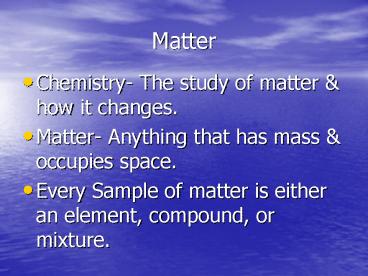Matter - PowerPoint PPT Presentation
1 / 21
Title:
Matter
Description:
Matter- Anything that has mass & occupies space. ... can be detected by color changes, fizzing or foaming, or production of sound, ... – PowerPoint PPT presentation
Number of Views:27
Avg rating:3.0/5.0
Title: Matter
1
Matter
- Chemistry- The study of matter how it changes.
- Matter- Anything that has mass occupies space.
- Every Sample of matter is either an element,
compound, or mixture.
2
Matter
- Element- Substance that cannot be broken down
into simpler substances. - The smallest unit of an element that keeps the
elements properties is an atom.
3
Matter
- Each element is made of one kind of atom.
- Two or more elements combine chemically to make a
compound.
4
Matter
- Compound- Substance made of atoms of more than
one element bound together. - Every compound is unique different from the
elements it contains.
5
Matter
- A molecule acts as a unit.
- Molecule is the smallest unit of a substance that
behaves like the substance.
6
Matter
- Chemical formulas represent compounds
molecules. - Chemical formulas show how many atoms of each
element are in a basic unit of a substance.
7
Matter
- Pure substance is matter that has a fixed
composition definite properties. - Pure substances blended together make mixtures.
8
Matter
- Elements compounds are pure substances, but
mixtures are not. - Mixtures are classified by how thoroughly the
substances mix.
9
Matter
- Heterogeneous Mixtures are not uniformly mixed.
- Homogeneous Mixtures are the same throughout.
10
Matter
- Miscible- Two or more liquids that are able to
mix. - Immiscible- Two or more liquids that dont mix.
11
Properties of Matter
- Matter has physical chemical properties.
- Physical properties are characteristics of a
substance that can be observed without changing
the composition of the substance.
12
Physical Properties
- Physical properties
- Help identify substances
- Can be observed or measured
- Help determine uses
13
Basic Properties
- Shape Color
- Odor Texture
- Melting Pt. Boiling Pt.
- Strength Hardness
- Density Conduct heat
14
Physical Properties
- Melting Point- The temperature at which a
substance changes from a solid to a liquid. - Boiling Point- The temperature at which a liquid
changes to a gas
15
Density
- Density is a measurement of how much matter is
contained in a certain volume of a substance. - Density is calculated by dividing the objects
mass by the objects volume.
16
Chemical Properties
- A chemical property describes how a substance
changes into a new substance, either by combining
with other elements or by breaking apart into new
substances.
17
Chemical Properties
- Flammability is a chemical property that
describes whether substances will react in the
presence of oxygen and burn. - Reactivity is the capacity of a substance to
combine with another substance.
18
Chemical Physical Properties
- Chemical changes are changes in composition.
- Physical changes do not change composition.
19
Changes of Matter
- A physical change affects one or more physical
properties of a substance without changing the
identity of the substance. - Dissolving is a physical change.
20
Changes of Matter
- A chemical change happens when one or more
substances are changed into entirely new
substances that have different properties. - Chemical changes can be detected by color
changes, fizzing or foaming, or production of
sound, heat, light, or color.
21
Mixtures and Compounds
- Mixtures and compounds must be separated in
different ways. - Mixtures can be separated by physical changes,
but compounds must be broken down by chemical
changes.































